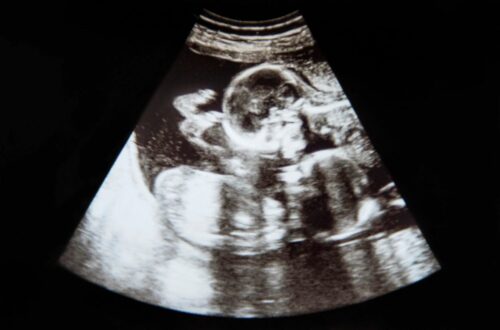Imagine you are placed into a time travel capsule and sent 100 years into the future. Before you are jetted off, you are allowed to make some changes to the activities of human beings in the present that may make your life better or more tolerable 100 years from now. You have been studying climate science and it seems to you that there is a 50% probability that some of our activities in the present will have bad consequences 100 years from now. So, you make some changes to human activities that will perhaps mitigate the harmful effects of those activities. Then you are sent into the future.
If what I have said sounds reasonable it is because there are people who are going to live in 100 years time and, if predictions turn out correctly, they will wish people living 100 years ago would have made changes to their lives in order to mitigate the effects of those activities on those living in the future.
Now imagine you are placed into a time travel capsule, but this time you will be sent back to the time at which you were a fetus in the womb. You are told that, apart from your conception and presence in your mother’s womb, what happens after that point in time won’t be the same as the past as you remember it now. It would be like an alternative past running parallel to the past as you recall it now. In this case, instead of being permitted to make a change to the present activities of human beings, you are permitted to make a change to the way people lived at the time you were a fetus. You consider the possible risks to your life as a fetus and draw the conclusion that the most pressing risk you face in the past is the risk of being aborted. Thus, you deem abortion illegal for the past thereby guaranteeing as much as possible your arrival into the world from the womb.
Your decision in the second scenario is as reasonable as the first. There are many people who were aborted in the past who, if they had not been aborted, would wish now that they were not aborted in the past. There are also people now in the womb who, in the future, if they are not aborted, will wish that they were not aborted in the past.
In both cases you are seeking to mitigate a possible threat to your life. In the first scenario, the threat is from the effects of climate change and in the second scenario, the threat to your life is from abortion. You act rationally to mitigate the effects of actions that harm your life either in the past or in the future.
In both cases, you act rationally not only because some actions will turn out to harm you personally, but because you are able to imagine someone else being harmed by those actions. In the first scenario, you can imagine someone in the future who is glad we acted or annoyed that we didn’t. In the second scenario, you can also imagine someone who is glad that his/her mother did not have an abortion. You can also imagine someone who, if they had not been aborted in the womb, would, if they were alive today, want to change the past so that they were not aborted. Thus, if you think we ought to act now to mitigate the effects of climate change in the future, you will also think we ought to act now to prevent the abortion of people in the womb.
If you think we ought to act now to mitigate the effects of climate change in the future, you will also think we ought to act now to prevent the abortion of people in the womb.
Someone might say that there is a greater risk from climate change in the future than you being aborted in the past. Thus, there is less motivation to prevent abortion in the past. However, though there is risk of harm in the future, there is risk of being killed in the past. Not the same kind of risk. In the future there is a higher probability of harm to some degree; in the past there is a lower probability of harm to a maximal degree.
Someone might say that when you were a fetus, you weren’t really a person so if you were aborted, it would be the same as never having existed rather than having been killed. In reply, you could suggest that from your perspective never having existed and being killed amount to pretty much the same thing.
Furthermore, how confident is the objector that you weren’t a person when you were a fetus? From your point of view, there appears to be evidence both ways. Recall, that is was reasonable to act to mitigate the future effects of climate change with only a 50% probability that some activities will have a dreadful consequence in the future. Even if the objector thinks that there is a much lower probability of a fetus being a person, that is still enough not to take chances. If a huntsman even suspects he is aiming his gun were there might be a person, he is right not to discharge his weapon in that direction. The same is true in your scenario – you act rationally even when there is only a small probability that you were a person when you were a fetus.
Argument based on arguments given by Harry Gensler in Ethics: A Contemporary Introduction (Routledge, 2018).





